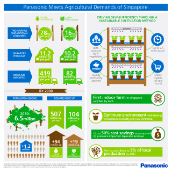Panasonic Contributes to Singapore’s Self-Sufficiency Level of Vegetables with First Indoor Vegetable Farm
Target to supply 5% of local production by FY2016, starting with commercial partnership with Ootoya Japanese Restaurant
31 July 2014, Singapore – Panasonic Factory Solutions Asia Pacific (Panasonic) announced today its pilot commercial supply of locally-harvested vegetables to Japanese restaurant, Ootoya. The premium Japanese crop varieties, mini red radish; red leafy lettuce; and mizuna (potherb mustard) are cultivated in the country’s first licensed indoor vegetable farm with controlled and optimised conditions. In land scarce Singapore where only 8% of vegetables consumed are grown in local farms1, Panasonic aims to contribute to the Agri-Food and Veterinary Authority’s (AVA) vision of raising self-sufficiency level for leafy vegetables through its technology and harvest. The company targets to increase its contribution to local production from the current 0.015% to 5% by FY2016, fiscal year ending March 2017.
Hideki Baba, Managing Director, Panasonic Factory Solutions Asia Pacific, said, “Combining Panasonic’s technological and manufacturing expertise, these premium Japanese crops are grown in optimum conditions, where temperature, humidity and CO2 levels are monitored and controlled, ensuring stable, high-quality production throughout the year. The soil-based cultivation is pesticide-free and complies with AVA’s stringent food safety standards. Our indoor vegetable farm is also HACCP certified. With over 90% of the food consumed in Singapore being imported, Panasonic hopes the indoor vegetable farm can contribute to the nation’s food self-sufficiency levels and at the same time provide a better life and a better world through improved food quality.”
The 248m2 indoor agriculture facility currently produces 10 types of vegetables – green and red leafy lettuce, mizuna (potherb mustard), mini red and white radish, rocket lettuce, basil, ooba (mint herb), mitsuba (wild parsley) and baby spinach. Both leafy and root vegetables are cultivated in the controlled soil-based environment with LED lighting. At present, total production capacity is at 3.6 tonnes annually. Through this local indoor cultivation, customers can potentially gain significant savings compared to purchasing similar premium Japanese produce that are imported.
The company is strengthening its research and development efforts to accelerate harvest such as increasing shelf capacity (vertical farming), shortening cultivation lead time from 35 days to 28 days, improving area productivity and expanding crop variety. By FY2016, Panasonic is looking to grow more than 30 crop varieties.
Panasonic will assess market demand for commercial expansion to restaurants and supermarkets within this fiscal year. Currently, it supplies on average, 0.3 tonnes of vegetables to all three Ootoya outlets in the country per month – Changi City Point, Clementi Mall and Orchard Central. The company aims to double this amount in the next two years and supply wider varieties of premium Japanese crops that are not cultivated locally to Ootoya restaurants.
Hisami Mitsumori, Chairman, Ootoya Holdings, commented, “Ootoya prides ourselves in offering authentic and healthy home-cooked Japanese food to our customers. Being a restaurant, food safety and quality are top priority, especially in overseas markets where we do not have our own agriculture facility to grow crops like we do in Japan. The commercial partnership with Panasonic is a natural fit as the facility adopts an eco, sustainable and cost-efficient method of farming. We are also able to get fresh, crunchy and pesticide-free Japanese produce, allowing customers to enjoy healthy and delicious meals.”
Vegetables are delivered fresh from Panasonic’s indoor agriculture farm to Ootoya restaurants daily, ensuring that quality of harvest is maintained.
As one of the leading factory automation solutions providers, Panasonic Factory Solutions Asia Pacific is committed to design and develop indoor agriculture solutions to meet market demand for stable and sustainable production of locally-harvested premium crops.
For more photos of the event visit here .
1Source: http://www.ava.gov.sg/Singapore+Food+Supply.htm
About Panasonic Asia Pacific
Panasonic Asia Pacific provides the whole range of the brand’s products and solutions across the South East Asia and Pacific (APAC) region. The company focuses on promoting its Business-to-Business portfolio, such as in the field of energy solutions, whilst maintaining solid Business-to-Consumer growth, in line with the group’s global direction.
The region has 45 manufacturing sites, which hold as a key hub for Panasonic’s global production activities supporting the consumer, solutions and components and devices business. Based in Singapore, Panasonic Asia Pacific regional headquarter encourages locally-initiated energy solutions partnerships and businesses. In this fiscal year, the headquarters will also strengthen the company’s foothold in emerging markets. Panasonic Asia Pacific will continue to promote green innovation and reduce its regional carbon dioxide emissions footprint in support of Panasonic’s global eco initiatives.
About Panasonic Factory Solutions Asia Pacific
Panasonic Factory Solutions Asia Pacific (PFSAP), a registered business of Panasonic Asia Pacific Pte. Ltd., delivers innovative solutions that add significant value to customers’ production and process, aimed at enhancing output.
PFSAP has manufactured Auto Insertion (AI) machines in-house since 1989. Over the years, PFSAP has added Surface Mount Technology (SMT) machines and Microelectronics machines with manufacturing capabilities to its product range. In October 2013, the facility established its indoor agriculture farm, which currently produces premium Japanese vegetables for local consumption. The crops are grown in controlled soil-based environment with optimized cultivation conditions.
About Ootoya Asia Pacific
Ootoya Asia Pacific, a subsidiary of Ootoya Holdings Co. Ltd., prides itself in offering authentic, healthy and superior quality home-cooked Japanese food to its customers at a reasonable price. In 2005, the company opened its first Asia Pacific outlet in Bangkok, Thailand. Ootoya Asia Pacific has presence in Taiwan, Hong Kong, Indonesia, Singapore and China. Currently, it has three outlets in Singapore, located at Changi City Point; Clementi Mall; and Orchard Central.
Established in 1958, the Ootoya group of companies have a total of 316 restaurants in Japan and 84 restaurants overseas.
For media enquiries, please contact:
Ms. Viktoriya Chamata
Panasonic Asia Pacific
viktoriya.chamata@sg.panasonic.com
Tel: (+65) 9770 0193
Ms. Adrienne Ser
GolinHarris
aser@golinharris.com
Tel: (+65) 8571 6855



